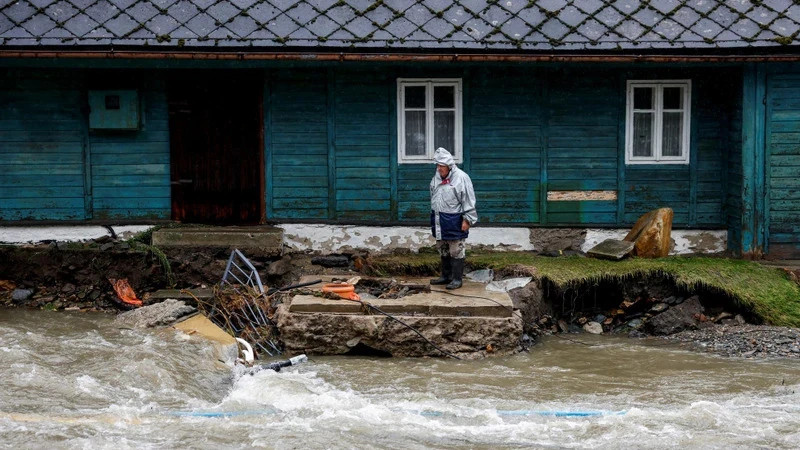This is a positive step ahead of the 29th Conference of the Parties to the United Nations Framework Convention on Climate Change (COP29), which will take place in Azerbaijan in November. However, challenges remain on the path to finding resources to support developing countries in their efforts to combat climate change.
Contributing to common effort
The EU and its member states are the largest contributors to international climate finance, having doubled their funding for developing countries to combat climate change since 2013. The EC emphasises its commitment to continuing climate finance goals and achieving ambitious collective targets beyond 2025.
Leading the EU's efforts, the German Government is actively implementing its global fair climate commitment to support developing and emerging countries adapting to climate change. In 2023, Germany provided 9.9 billion EUR as part of the 100 billion USD annual climate funding package pledged by developed industrialised nations to assist developing and emerging countries. Out of the 9.9 billion EUR, 5.7 billion EUR came from the federal budget, while the remainder was sourced from loans provided by the German KfW Development Bank and the German Investment and Development Company (DEG) for energy transition projects. German Federal Minister for Economic Cooperation and Development affirmed that Germany is a reliable partner in climate protection.
In its efforts to mobilise financial resources to help developing countries, the World Bank (WB) has intensified its funding for climate solutions. WB President Ajay Banga aims to reform the institution and enhance support for nations grappling with the impacts of climate change.
In December 2023, the WB committed to increasing the annual funding rate for climate adaptation activities from 35% to 45% in the 2025 fiscal year, starting from July. The WB stated that it is on track to meet this goal in the 2024 fiscal year, with nearly 44% of the total 97 billion USD it has committed already allocated for climate-related projects.
The WB has recently announced a record grant of 42.6 billion USD dedicated to climate change efforts in the 2024 fiscal year, representing a 10% increase from the previous year. This funding has been allocated to support efforts to eradicate global poverty, invest in clean energy, build climate-resilient communities, and promote stronger economic growth.
However, the WB also noted that much work remains to be done. Recently, multilateral and bilateral creditors have introduced "climate resilient debt clauses" in government loan agreements to reduce pressure on small and struggling countries to repay debts.
Last year, several bilateral and multilateral creditors, including the WB and the Inter-American Development Bank, announced the implementation of these clauses in their loan agreements. Currently, 44 countries are eligible for WB debt relief clauses in the event of natural disasters.
Australia is one of the largest donors and lenders to the South Pacific region, which is vulnerable to climate change and where many countries face financial pressures.
Last year, the UK also announced its first climate-related debt clause with Senegal and Guyana and is working to expand this mechanism to an additional ten countries.
Many barriers remain
Climate change can only be addressed through a collective global effort, including from countries dependent on aid. Adapting to climate change plays a crucial role in ensuring that people can maintain their livelihoods in the face of climate challenges.
However, mobilising financial resources, considered the most critical factor for developing countries to adapt to and combat climate change, still faces numerous barriers. Nations have yet to reach a consensus on a crucial treaty regarding climate funding, with divisions over who pays and how much. This reality threatens the ability to reach an agreement at COP29.
Major donors, including the EU and the US, have not yet disclosed their willingness to provide funding while facing pressure to specify amounts, especially amid political and economic instability in many developed countries.
Developed industrialised nations have committed to standing together to support developing and emerging countries in the tough fight against climate change. Still, with the budgetary constraints many traditional donor countries face, there is a global call to seek and increase new financial resources to help southern hemisphere nations fulfil their climate protection obligations.
COP28 paved the way for a global commitment to phase out fossil fuels and to triple renewable energy use and double energy efficiency by 2030.
This is a significant success that requires all nations to act consistently. However, international efforts to reduce greenhouse gas emissions contributing to global warming remain insufficient to keep the Earth’s temperature rise below 1.5°C compared to pre-industrial levels, as set out in the Paris Agreement on climate change. Meanwhile, developing countries affected by climate change find it challenging to reach an agreement at COP29 to secure over 1 trillion USD per year in climate finance—ten times the current funding level.
COP29 is viewed as a "finance COP," as wealthier nations, responsible for the majority of global warming, may make new commitments to significantly increase aid to poorer countries for climate action. The current commitment of 100 billion USD per year will expire in 2025 and is far below the needs of developing nations. The host country of COP29, Azerbaijan, calls on all parties to make the most of this critical period leading up to COP29 to seek consensus on these issues.
Some nations argue that, in addition to developed industrialised countries, other nations that have never been donors need to take more action, particularly those that are major greenhouse gas emitters and possess the necessary financial resources.
















